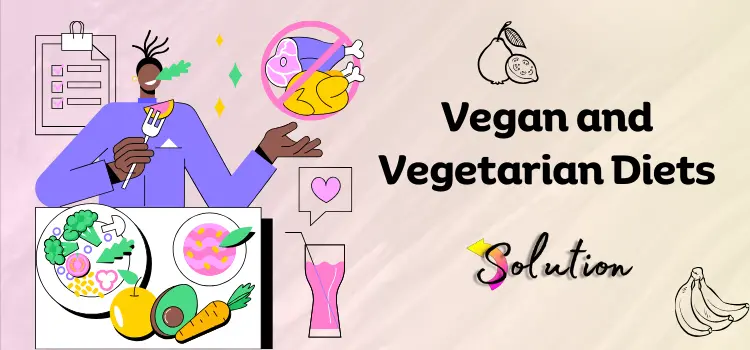
Many people are becoming more aware of their dietary choices and their impact on their health and the environment, making vegan and vegetarian diets increasingly popular. Our food greatly affects our health, the earth, and society. Of these options, vegan and vegetarian diets have become very popular because people think they are better for your health, more ethical, and better for the world.
People also think these diets are more sustainable and better for the earth and animals. However, switching to a vegan or vegetarian diet can be difficult because you may need more nutrients and help to make friends. This blog discusses the pros and cons of vegan and vegetarian meals for health. It does this by helping people make smart food choices that align with their health goals and values.
Understanding Vegan and Vegetarian Diets
A). Vegetarian Diet
A vegetarian diet excludes meat, poultry, and fish but includes dairy products and eggs. The different types of vegetarian diets are as follows:
- Lacto-vegetarian: Includes dairy products but excludes eggs.
- Ovo-vegetarian: Includes eggs but excludes dairy products.
- Lacto-ovo vegetarian: Includes both dairy products and eggs.
- Pescatarian: Includes fish and seafood but excludes meat and poultry.
- Flexitarian: Primarily a vegetarian diet, but occasionally includes meat and fish.
B). Vegan Diet
On a vegan diet, you can’t eat animal goods, like meat, poultry, fish, dairy, eggs, and sometimes honey. The vegan diet only includes plants, like fruits, veggies, grains, nuts, and seeds.
Health Benefits of Vegan and Vegetarian Diets
Let’s explore the different health benefits of vegan and vegetarian diets for your body:
A). Nutritional Benefits
- High in Nutrients: Vegan and veggie diets are rich in vitamins, minerals, fiber, and antioxidants. Usually, they have more fruits, veggies, whole grains, nuts, and seeds, all of which are high in nutrients and beneficial for your health.
- Lower in Saturated Fats: Compared to meat-based meals, these tend to have less cholesterol and saturated fats. If you do this, heart disease and high blood pressure may be less likely.
- High in Fiber: Plant-based meals are high in dietary fiber, which helps your body digest food well, keeps you at a healthy weight, and lowers your risk of colon cancer.
B). Disease Prevention
- Heart Health: Studies have shown that eating a vegan or vegetarian diet can significantly lower the chance of heart disease. People who follow these diets tend to have lower cholesterol, blood pressure, and body mass index (BMI).
- Diabetes Care: Eating a plant-based diet can improve insulin’s effectiveness and lower the chance of developing type 2 diabetes. Plant foods also help keep blood sugar levels normal because they contain a lot of fiber and have a low glycemic index.
- Cancer Prevention: Studies have linked a diet high in fruits, vegetables, and whole grains to a lower chance of some types of cancer, such as colon, breast, and prostate cancer. Plant foods are full of antioxidants and phytochemicals that protect cells from potential harm against cancer.
- Weight Management: People who follow a vegan or vegetarian diet often have a lower BMI and a lower chance of becoming obese. The high fiber content makes people feel full for longer, which helps them eat fewer calories.
- Longevity: Some studies show that people who eat a plant-based diet may live longer because they are less likely to get chronic diseases and are healthier generally.
C). Environmental and Ethical Benefits
- Effects on the environment: Diets high in plants use fewer natural resources and release fewer greenhouse gases than diets high in animal goods. This makes vegetarian and vegan diets more sustainable and better for the earth.
- Animal Welfare: A lot of people choose vegan or vegetarian diets for moral reasons, such as caring about animals’ well-being and being opposed to factory farming.
Also Read:-What is Digital Detox
Vegan and Vegetarian Diets: Challenges
Understanding the challenges of vegan and vegetarian diets is important to ensure a balanced and nutritious diet. Some of the common challenges that you may face while adopting a vegan or vegetarian diet are as follows:
A). Nutritional Deficiencies
- Vitamin B12: This vitamin can only be found in animal-based foods. Vegans and vegetarians may need to consume B12-fortified foods or take supplements to ensure adequate intake. B12 is important for nerve function and DNA and red blood cell formation.
- Iron: Tofu, spinach, and lentils are high in iron on a plant-based diet. However, the body doesn’t absorb non-heme iron as quickly as heme iron from animal sources. Eating iron- and vitamin C-rich foods can help the body absorb iron better.
- Calcium: Vegans may struggle to get enough calcium, typically found in dairy products. Tofu, nuts, leafy greens, and fortified plant milk are all plant-based foods that can help you get the calcium you need.
- Omega-3 Fatty Acids: These are important for brain health and can mostly be found in fish. If you’re a vegan, you can get omega-3s from flaxseeds, chia seeds, hemp seeds, walnuts, or algal oil pills.
- Protein: Vegans must be more careful about mixing different plant proteins (like beans and rice) to ensure they get all eight necessary amino acids. Vegetarians can get protein from dairy and eggs.
B). Social and Practical Challenges
- Going Out to Eat: Finding tasty choices at restaurants or social events can be hard. While increasingly more restaurants offer vegan and veggie options, few remain, especially in some areas.
- Foods You Can Get Quickly: Many quick foods aren’t vegan or vegetarian. Making meals from scratch gives you more control over the items but takes more time and work.
- Acceptance in Society: Following a vegan or vegetarian diet may cause problems with other people, especially in groups where eating meat is common. It can be stressful to deal with social settings and explain food choices.
- Food Labels: Vegans and vegetarians must read and understand food labels to avoid products derived from animals. This can sometimes take a lot of time and be challenging to understand.
C). Potential Health Risks
- Over-Reliance on Processed Foods: Vegan and vegetarian meals can be good for you, but they can also include processed foods high in sodium, sugar, and fats, which are bad for you. Eating whole foods prepared as minimally as possible is best for your health.
- Not Getting Enough Protein: Some people may have trouble getting enough protein, which can cause muscle loss and other health problems. To ensure you get enough protein, you must plan your meals carefully.
- Bone Health: Your bone health could worsen if you don’t get enough calcium and vitamin D. Some people require fortified foods and vitamins to keep their bones strong and avoid breaking them.
- Nutritional Imbalance: If you eat a vegan or vegetarian diet that isn’t balanced, you could miss out on important nutrients. Talking to a doctor or dietitian can help create a healthy diet.
Tips for a Balanced Vegan or Vegetarian Diet
Maintaining a balanced vegan or vegetarian diet is crucial for overall health and well-being. But, sometimes, maintaining it throughout life can seem daunting. Some of the useful tips that will help you maintain a balanced vegan or vegetarian diet are as follows:
- Variety is Key: Eat a variety of fruits, veggies, whole grains, nuts, seeds, and legumes to get a variety of nutrients.
- Smart Supplements: If necessary, you could take pills for vitamin B12, vitamin D, omega-3 fatty acids, and other nutrients. Getting regular blood tests can also help monitor vitamin levels.
- Fortified Foods: Add fortified grains, plant milk, and nutritional yeast to your diet to get more vitamins and minerals your body needs.
- Mix Proteins: Eat a variety of plant proteins together to get all of the necessary amino acids. Beans and rice, or hummus and whole-grain bread, are two examples.
- Stay Informed: Learn about nutrition and keep up with new studies on vegan and vegetarian diets. This can help you make smart decisions and eat a healthy, balanced meal.
- Pre-Planned Meals: Creating meal plans can help you eat a healthy, balanced diet and make it easier to stick to vegan or vegetarian options. By pre-planning the meals in advance, you can save time and make wise decisions when choosing healthy and tasty meal options.
Ending Note
Vegan and vegetarian meals are good for your health, as they make your heart healthier, help you control your weight, and lower your risk of chronic diseases. They also help protect the earth and ethically treat animals. But these diets must be carefully planned to ensure you get all the important nutrients and a fair amount of them. People can get the health benefits of vegan and vegetarian diets while reducing the problems that might arise by learning about them, planning their meals, and taking extra nutrients.
Ultimately, people should decide whether to follow a vegan or vegetarian diet based on their health needs, morals, and lifestyle choices. Following these plans correctly can help you live a healthy, happy, and kind life.


